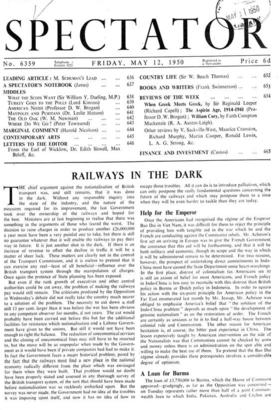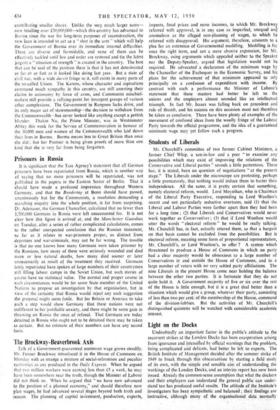A Loan for Burma
The loan of £3,750,000 to Burma, which the House of Commons approved—grudgingly, as far as the Opposition was concerned— on Tuesday represents rather more than half of a joint Common- wealth loan to which India, Pakistan, Australia and Ceylon are contributing smaller shares. Unlike the very much larger sums— now totalling over f70,000,000—which this country has advanced to Burma since the war for long-term purposes of reconstruction, the new loan is intended to act as a " shot in the arm " which will holp the Government of Burma over its immediate internal difficulties. These are diverse and formidable, and none of them can be effectively tackled until law and order are restored and (in the latest jargon) a " situation of strength " is created in the country. The best that can be said of the position there is that it has not deteriorated as far or as fast as it looked like doing last year. ' But a state of civil war, with a wide dacoit fringe to it, still exists in many parts of the so-called Union. The Karens, whose character and aspirations command much sympathy in this country, are still asserting their claims to autonomy by force of arms, and Communist mischief- makers still provide a rallying-point for insurgent groups of various other complexions. The Government in Rangoon lacks drive, and its only major act of statesmanship—the decision to withdraw from the Commonwealth—has never looked like anything except a pettish blunder. Thakin Nu, the Prime Minister, was in Westminster Abbey this week for the Service of Commemoration in honour of the 10,000 men and women of the Commonwealth who laid down their lives in Burma. Burma means less to Great Britain than once she did ; but her Premier is being given proofs of more than one kind that she is very far from being forgotten.







































 Previous page
Previous page